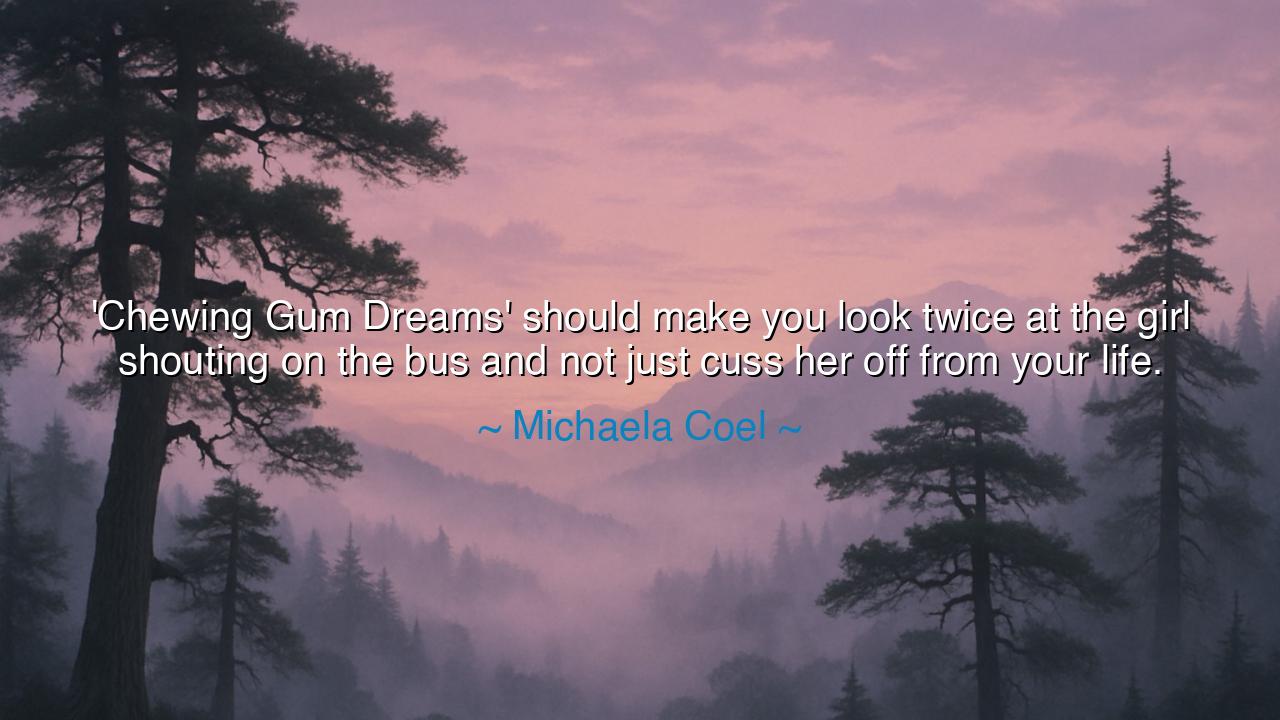
'Chewing Gum Dreams' should make you look twice at the girl
'Chewing Gum Dreams' should make you look twice at the girl shouting on the bus and not just cuss her off from your life.






“‘Chewing Gum Dreams’ should make you look twice at the girl shouting on the bus and not just cuss her off from your life.” Thus spoke Michaela Coel, the playwright, poet, and truth-teller of our age — a voice forged in the streets of London, yet echoing with the timelessness of human empathy. In this sentence, simple yet profound, she captures a sacred teaching: that every soul we meet carries a story, and that to judge without understanding is to close our eyes to the divine complexity of humankind. Her words call us to see beyond behavior, to peer into the hidden chambers of circumstance and pain that shape a person’s cry.
The origin of this quote lies in Coel’s own work, her play “Chewing Gum Dreams,” which later became the acclaimed television series Chewing Gum. It is the tale of Tracey Gordon, a young woman navigating the chaos of youth, faith, and identity within the constraints of poverty and expectation. But more than a story, it is a mirror — one that reflects not only the laughter and struggle of a single girl, but the world’s tendency to dismiss those who live loudly. The “girl shouting on the bus,” Coel tells us, is not a nuisance to ignore or condemn, but a human being yearning to be seen, to be understood in a society that has never truly listened.
In this, Coel’s words echo the wisdom of the ancients, who taught that the soul’s suffering often hides behind noise. The philosophers of old said that those who cry out in anger or foolishness are often the ones whose hearts bear invisible wounds. So too, the prophets and poets reminded us that compassion begins not in agreement, but in attention — in the sacred act of looking twice, of asking, “What has this person endured to become who they are?” To look twice, as Coel commands, is to awaken from the slumber of indifference; it is to choose empathy over ease, humanity over haste.
Consider the story of Mary Magdalene, as told in ancient scripture. To the world, she was a woman of disgrace — loud, defiant, untamed. Many turned away from her, cursing her name. But when she was truly seen — when one dared to look twice — her story changed from shame to salvation. It was revealed that beneath her scars lay faith, resilience, and love. So it is with the “girl shouting on the bus.” When we look only once, we see the noise; when we look twice, we see the human beneath the storm.
Michaela Coel’s insight also speaks to the power of art — that art, when honest, does not entertain the comfortable but awakens the sleeping heart. “Chewing Gum Dreams” is not simply a story of one girl’s life; it is a revelation of society’s blindness, a challenge to all who rush to judgment without seeking understanding. Coel reminds us that stories — whether told on a stage, a screen, or through the fleeting moments of real life — are bridges to empathy. To watch, to listen, to read — these are not idle acts, but moral ones. They teach us to see the world not as a hierarchy of worthiness, but as a chorus of shared struggle.
And yet, her words carry more than empathy — they carry responsibility. To “look twice” is not merely to feel pity, but to change the way we act. When you see the girl shouting on the bus, do not cuss her off — ask what she has been denied, what opportunities, what kindness, what hope. In this questioning lies the seed of justice. Every society that forgets to look twice becomes cruel, for cruelty begins not with violence, but with the failure to see. Coel’s message is thus not only for artists, but for every soul who walks among others: to be human is to bear witness to one another’s pain.
Therefore, O listener, remember this: do not be quick to judge what you do not understand. The loud, the broken, the unruly — these, too, are our teachers. Look twice at the ones the world dismisses, and you will glimpse the hidden dignity that dwells in them all. Listen for the story beneath the shout. For every person carries their own chewing gum dream — fragile, sticky, imperfect, yet full of longing for sweetness amid the bitter dust of life.
In the end, Michaela Coel’s words remind us that compassion is the highest form of intelligence, and that to see truly is to love wisely. The next time you pass a stranger in anger or annoyance, look again. You may find, behind their noise, a reflection of yourself — a heart that aches, a spirit that survives. And in that recognition, the distance between you will vanish, and what remains will be the oldest truth of all: that every soul, however rough its surface, is worthy of understanding, and that to look twice is to begin to heal the world.






AAdministratorAdministrator
Welcome, honored guests. Please leave a comment, we will respond soon